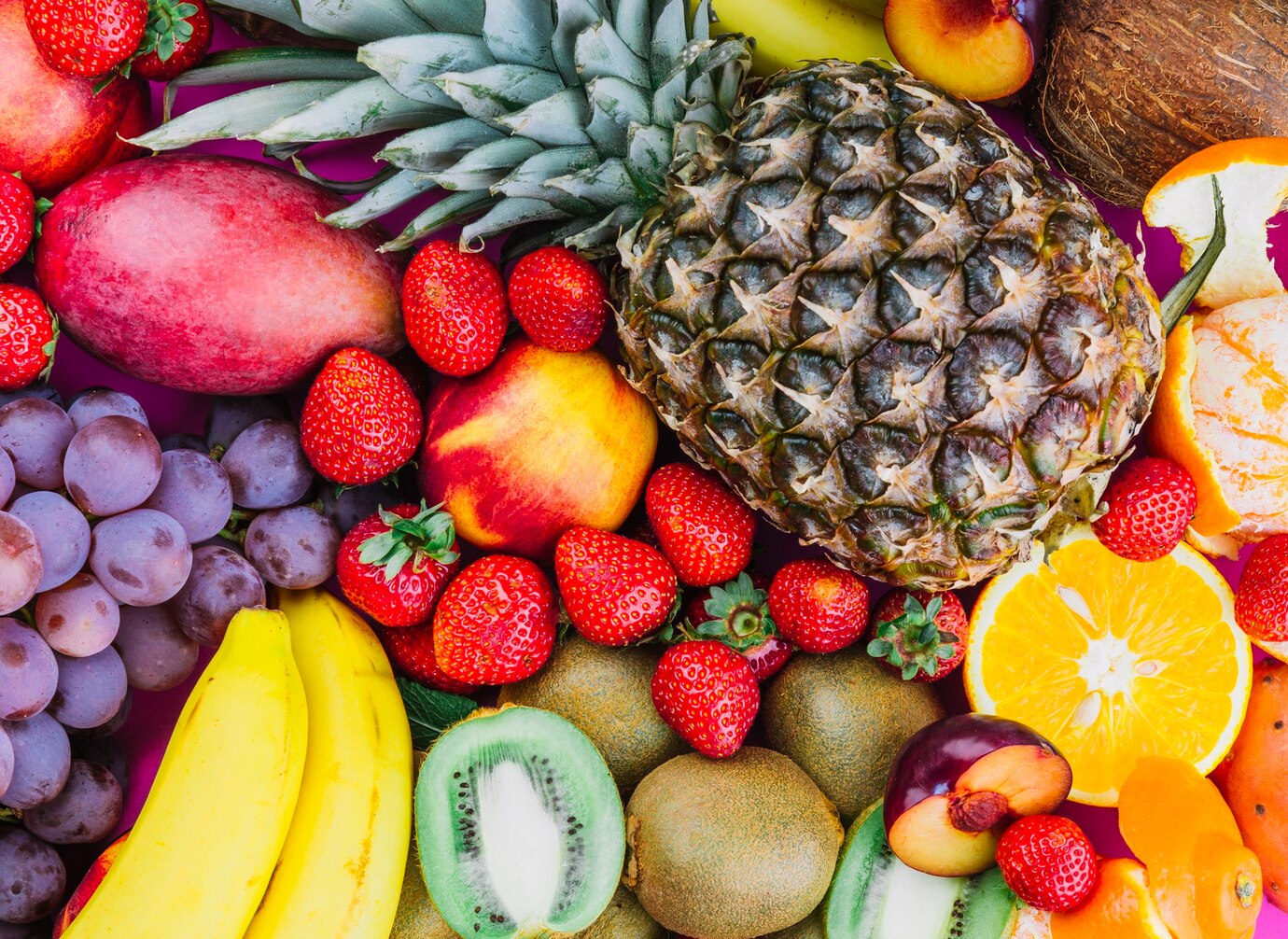How Many Calories in fruits?
Delving into the world of nutrition, one often encounters the question: ‘How many calories in fruits?’ As seasoned explorers of health and wellness, we embark on a journey to uncover the caloric secrets of nature’s bounty. Fruits, with their vibrant hues and tantalizing flavors, offer not just taste but also a plethora of nutrients vital for our well-being. From the crisp bite of an apple to the succulent sweetness of a mango, each fruit brings its unique nutritional profile to the table. Join us as we peel back the layers of understanding to reveal the calorie counts and nutritional riches hidden within these delectable treasures.
Here are different fruits with their calorific and nutritional value:
Calories in Fruits: Apple
Calories in Apple: 52 per 100g
Nutritional Value in Apple: Apples are rich in fiber, vitamin C, and various antioxidants. They are low in calories and high in water content, aiding in hydration. Apples also contain small amounts of vitamin K, potassium, and vitamin B6. The fiber in apples promotes digestive health and helps in maintaining healthy blood sugar levels. Consuming apples with their skin provides additional fiber and nutrients.
Learn more about calories in apple

Calories in Fruits: Banana
Calories in Banana: 89 per 100g
Nutritional Value in Bananas: Bananas are a good source of potassium, vitamin C, vitamin B6, and fiber. They are naturally sweet, making them a healthy alternative to sugary snacks. Bananas are known for their energy-boosting properties due to their carbohydrate content. They also contain small amounts of magnesium and vitamin A. Bananas are versatile and can be eaten on their own, added to smoothies, or used in baking.
Learn more about Calories in banana

Calories in Fruits: Orange
Calories in Orange: 47 per 100g
Nutritional Value in Orange: Oranges are renowned for their high vitamin C content, which supports immune function and skin health. They also provide fiber, potassium, and antioxidants such as flavonoids. Oranges are hydrating due to their high water content. Consuming oranges may aid in heart health, digestion, and reducing the risk of chronic diseases.

Calories in Fruits: Mango
Calories in Mango: 60 per 100g
Nutritional Value in Mango: Mangoes are tropical fruits rich in vitamins A and C, which are essential for immune function and vision health. They also contain folate, vitamin K, and potassium. Mangoes are high in natural sugars but provide fiber, which aids digestion and helps regulate blood sugar levels. Additionally, mangoes contain antioxidants like mangiferin and quercetin, which may have anti-inflammatory properties.

Calories in Fruits: Grape
Calories in Grape: 69 per 100g
Nutritional Value in Grape: Grapes are packed with antioxidants, particularly resveratrol, which may have heart-protective effects. They are a good source of vitamin C, vitamin K, and potassium. Grapes also contain natural sugars and fiber, which promote digestive health and satiety. Consuming grapes may contribute to healthy skin, improved brain function, and reduced risk of chronic diseases.

Calories in Fruits: Pineapple
Calories in Pineapple: 50 per 100g
Nutritional Value in Pineapple: Pineapples are loaded with vitamin C, manganese, and bromelain, an enzyme with anti-inflammatory properties. They contain natural sugars and fiber, aiding in digestion and promoting gut health. Pineapples have a refreshing tropical flavor and can be enjoyed fresh, grilled, or blended into smoothies.

Calories in Fruits: Watermelon
Calories in Watermelon: 30 per 100g
Nutritional Value in Watermelon: Watermelons are hydrating fruits with a high water content. They are low in calories and contain antioxidants like lycopene, which may help protect against certain cancers and promote heart health. Watermelons also provide vitamin C, vitamin A, and potassium. Enjoying watermelon can help with hydration, especially during hot weather, and contribute to overall hydration levels.

Calories in Fruits: Strawberry
Calories in Strawberry: 32 per 100g
Nutritional Value in Strawberry: Strawberries are packed with vitamin C, manganese, and antioxidants like ellagic acid and quercetin. They are low in calories and high in fiber, promoting digestive health and satiety. Strawberries also contain anthocyanins, which give them their vibrant red color and may have anti-inflammatory effects. Consuming strawberries regularly may support heart health, blood sugar regulation, and skin health.

Calories in Fruits: Kiwi
Calories in Kiwi: 61 per 100g
Nutritional Value in Kiwi: Kiwis are rich in vitamin C, vitamin K, vitamin E, folate, and potassium. They also provide fiber and antioxidants like lutein and zeaxanthin, which promote eye health. Kiwis have a unique tangy flavor and can be eaten on their own or added to fruit salads, smoothies, or desserts.

Calories in Fruits: Blueberry
Calories in Blueberry : 57 per 100g
Nutritional Value in Blueberry: Blueberries are renowned for their high antioxidant content, particularly anthocyanins, which may have anti-inflammatory and brain-protective effects. They are also rich in vitamin C, vitamin K, and manganese. Blueberries provide fiber, aiding in digestion and promoting heart health. Incorporating blueberries into your diet may support cognitive function, improve insulin sensitivity, and reduce the risk of chronic diseases.

Calories in Fruits: Cherry

What fruits are low in calories?
Several fruits are known for being low in calories, making them excellent choices for those watching their calorie intake or aiming for weight loss. These fruits are not only low in calories but also rich in essential vitamins, minerals, and antioxidants, providing a plethora of health benefits.
One such fruit is watermelon, which is composed of over 90% water, making it incredibly hydrating and low in calories. With only about 30 calories per 100 grams, watermelon is a refreshing and guilt-free snack choice, especially during hot summer months.
Another low-calorie fruit is strawberries, with approximately 32 calories per 100 grams. These vibrant berries are loaded with vitamin C, manganese, and antioxidants like ellagic acid and quercetin. They’re also high in fiber, promoting digestive health and aiding in weight management.
Similarly, raspberries are another low-calorie option, providing about 52 calories per 100 grams. These tart and juicy berries are packed with fiber, vitamin C, manganese, and antioxidants, offering numerous health benefits while satisfying sweet cravings.
Furthermore, fruits like papaya, peach, and cantaloupe are also relatively low in calories, making them great additions to a balanced diet. Incorporating these fruits into your meals and snacks can help you feel full and satisfied without consuming excess calories, supporting your overall health and weight management goals.
| Fruit | Calories per 100g |
|---|---|
| Watermelon | ~30 |
| Strawberries | ~32 |
| Raspberries | ~52 |
| Papaya | ~43 |
| Peach | ~39 |
| Cantaloupe | ~34 |
| Honeydew Melon | ~36 |
| Apricot | ~48 |
| Guava | ~68 |
| Grapefruit | ~42 |
These fruits offer a delicious and nutritious way to incorporate more vitamins, minerals, and antioxidants into your diet while keeping your calorie intake in check. Enjoy the fresh, blended into smoothies, or added to salads for a refreshing and satisfying treat!
Best fruits for weight loss
Conclusion on Calories in Fruits
In conclusion, understanding the calorie content of fruits is crucial for maintaining a balanced diet and achieving weight management goals. While fruits are generally nutritious and provide essential vitamins, minerals, fiber, and antioxidants, their calorie content varies widely. Some fruits are naturally low in calories, making them excellent choices for those aiming to reduce calorie intake and manage weight. These include watermelon, strawberries, raspberries, and papaya, among others.
However, it’s essential to remember that calories are not the sole determinant of a fruit’s nutritional value. Factors such as fiber content, sugar content, and overall nutrient density also play significant roles in their impact on health and weight management. Incorporating a variety of fruits into the diet can provide a wide range of nutrients while keeping calorie intake in check.
Furthermore, while fruits are nutritious, consuming them in moderation is key, especially for individuals with specific dietary goals or health conditions. By being mindful of portion sizes and balancing fruit intake with other food groups, individuals can harness the nutritional benefits of fruits while maintaining a healthy weight and overall well-being. Ultimately, a varied and balanced diet, along with regular physical activity, is essential for optimal health and weight management.









